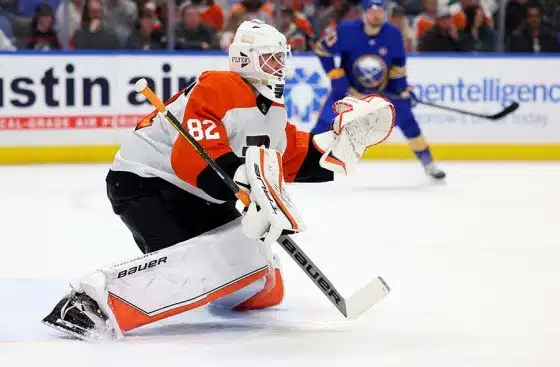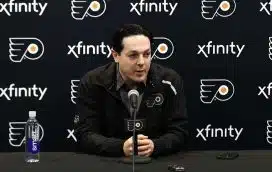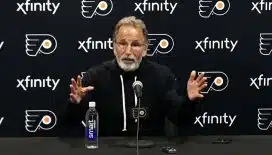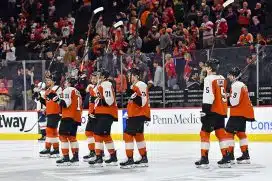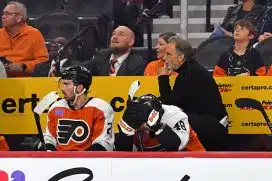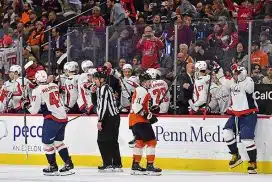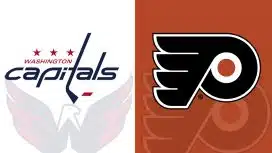On Friday night, four decades of Flyers past will gather at Santander Arena in Reading for a celebration of Flyers hockey and some friendly competition.
Tickets for the event were almost an instant sell-out and rosters were announced for the event on Tuesday.
Here is a detailed look at the participants for Team Orange and Team White.
Team Orange
F Ray Allison – A Flyer from 1981 to 1987, Allison possessed the ability to score goals and add a mean streak to his playing days. His first two seasons in Philadelphia, Allison combined to score 38 goals and accumulate 161 penalty minutes. After two solid seasons with the Flyers, an ankle injury forced him out of the regular lineup and the final five seasons of his NHL career and eight seasons in professional hockey were spent between Philadelphia and the AHL with Hershey.
F Frank Bialowas – Affectionately known as the Animal, Bialowas is a Phantoms legend. With an image that embodied the Flyers franchise for decades, Bialowas’ rugged appearance accompanied a style of play that fit the mold. This hard-hitting forward with a natural fighting side remains a fan favorite in Phantoms lore. Bialowas spent parts of three seasons with the Phantoms from 1996 to 1999. He was a member of the 1997-98 Calder Cup winning Phantoms team and inducted into the Phantoms Hall of Fame in 2005.
F Danny Briere – This big at heart forward stood just 5’9” but came up huge in many games, particularly around playoff time, earning him the nickname “Mr. Playoffs.” Briere spent six seasons with the Flyers from 2007 to 2013, scoring 124 goals and 283 points in 364 games. Briere’s playoff totals were more impressive. In 51 playoff games with the Flyers over five seasons, Briere scored 31 goals and recorded 72 points. Since announcing his retirement in the offseason prior to the 2015-16 season, Briere has been working within the Flyers organization.
G Frederic Cassivi – Cassivi’s connection to the Flyers comes as a member of the team’s ECHL affiliate, the Reading Royals, where he played just one game in the 2012-13 season. Cassivi was a longtime member of the Hershey Bears, from 1999 to 2002 and again from 2005 to 2008. He played 13 NHL games with the Atlanta Thrashers and Washington Capitals.
D Terry Carkner – A staple of the Flyers blue line from 1988 to 1993, Carkner brought physicality and intensity to the Flyers. Racking up 867 penalty minutes in five seasons, Carkner also provided solid offense for a defenseman, a total of 29 goals and 132 points. Carkner had a 13-year NHL career, playing in 858 total games with 230 points and 1,588 penalty minutes.
F John Druce – Coming to the Flyers in the twilight of his career, Druce proved to be a valuable depth forward, suiting up in 79 games over three seasons for the Flyers. He scored just 12 goals and 26 points in his time with the Flyers – he had 21 goals and 49 points in 39 games playing for the Phantoms in part of the 1997-98 season – but proved to also be a valuable two-way player in the 1997 Stanley Cup Final run. His only playoff goal in 17 playoff games with the Flyers, a shorthanded goal against Mike Richter and the New York Rangers, proved to be valuable as well.
F Todd Fedoruk – Another who embodied the mold of a Flyer, Fedoruk packed a punch on many opponents in his day. Weighing in at 235 pounds, Fedoruk, known as “The Fridge,” picked up 575 penalty minutes in his 268 games with the Flyers. Given his role, he was bounced around between the NHL and AHL and dealt with several injuries. Fedoruk also played for the Anaheim Ducks, Dallas Stars, Minnesota Wild, Phoenix Coyotes and Tampa Lightning and scored 32 goals over his career, 15 of them coming in his final three seasons. As a Flyer, he scored just 13.
F Mark Freer – Freer came to the Flyers in 1987 and never strayed too far from the local hockey scene after that. He spent parts of five seasons between Philadelphia and the AHL in Hershey before being selected as part of the expansion draft to join the Ottawa Senators. After a season in Ottawa and one season in the Calgary Flames organization, Freer went on to play six seasons in the IHL with the Houston Aeros before returning to the local scene again for two seasons with the Phantoms and one with the Hershey Bears.
D Ed Hospodar – This rugged defenseman with a tough side was a part of two Stanley Cup Final runs for the Flyers, playing with the team in parts of three seasons from 1984 to 1987. In his 112 games with the Flyers, he scored just eight goals and totaled 321 penalty minutes.
D Mark Howe – A Hall-of-Famer in every sense of the word, Mark Howe, the son of hockey legend Gordie Howe, made a name for himself as a star with the Flyers. After three seasons with Hartford, Howe joined the Flyers in 1982 for his first of 10 seasons in Philadelphia. He would become one of the best offensive defensemen in the game, scoring 138 goals and tallying 480 points, both Flyers franchise records, in 594 games with the Flyers. A three-time Norris Trophy winner, a four-time Barry Ashbee Award winner, a Flyers Hall of Fame inductee in 2001, a Hockey Hall of Fame inductee in 2011 and his No. 2 hangs from the rafters as one of five numbers officially retired by the franchise.
F Bob Kelly – A fixture of the Flyers roster in the 70s, Kelly brought energy to his checking-line role but had a scoring ability as well. “The Hound” scored 128 goals in his Flyers career and added nine goals in the playoffs including the game-winning goal in Game 6 of the 1975 Stanley Cup Final, where the Flyers clinched their second of back-to-back Stanley Cups. He also had 296 career points as a Flyer to go along with 1,285 penalty minutes. Kelly now serves as an ambassador for the Flyers, on hand for almost all of the Flyers home games and making numerous appearances as a leader of the Flyers Alumni Association throughout the community.
F Orest Kindrachuk – Kindrachuk played a vital role as a bottom-six center for the Flyers and in his first two full seasons in the NHL, helped the Flyers to Stanley Cup titles. He would go on to score 79 goals and total 260 points in six seasons with the Flyers, including the first successful penalty shot in Flyers history.
D Ric Nattress – A 12-year NHL career came to an end for Nattress in Philadelphia in the 1992-93 season. He scored seven goals and added 10 assists for 17 points in 44 games in his final season as a pro after spending three seasons in Montreal from 1982 to 1985 and five seasons in Calgary from 1987 to 1992.
D Jim Watson – Along with his brother Joe – we’ll get to him later – the Watson brothers were stable blueliners for the Flyers in the 70s, helping the franchise to two Stanley Cup titles. A career Flyer from 1972 to 1982, Watson played 613 career games, scoring 38 goals and adding 148 assists for 186 points. He also played in 101 career playoff games over his career, adding 39 points to his total. Watson will join his brother Joe among the many names in the Flyers Hall of Fame later in the month on Feb. 29.
Coaches
Rick MacLeish – One of his many goals is perhaps the most famous in Flyers history. MacLeish’s deflection of Andre Dupont’s shot in Game 6 of the 1974 Stanley Cup Final proved to be the only needed for the Flyers in the 1-0 win over Boston that claimed their first Stanley Cup. MacLeish did a lot more scoring in his 741 games with the Flyers. Overall, he tallied 328 goals and 697 points, making him one of the best goal scorers in the early years of the Flyers. Acquired from the Boston Bruins while still just a prospect, he is the first Flyer to score 50 goals in a single season, achieving the feat in the 1972-73 season.
Bernie Parent – The Hall-of-Fame goaltender who carried the Flyers to back-to-back shutout wins in Stanley Cup clinchers was simply the best the Flyers ever had between the pipes. A winner of the Vezina Trophy twice as well as a Conn Smythe winner in both of the Flyers championship playoff runs, Parent would produce astounding numbers in his 10 seasons with the Flyers, posting a 2.42 GAA and recording 232 career wins and 50 shutouts. In the Flyers two Stanley Cip winning seasons, Parent led the lead in wins (47 in 1973-74, 44 in 1974-75), GAA (1.89 in 1973-74, 2.03 in 1974-75), and shutouts (12 in both seasons). Inducted into the Flyers Hall of Fame inaugural class in 1988, inducted into the Hockey Hall of Fame in 1984 and his No. 1 is retired by the team. Parent still remains an icon in the Flyers organization, making regular appearances at home games and Alumni events.
Dave Schultz – When you think “Broad Street Bullies,” you think of Dave Schultz. “The Hammer” didn’t record any penalty minutes in his first and only NHL game in 1971-72, but once he became a regular member of the Flyers lineup in 1972-73, he would make frequent trips to the sin bin, leading the league in penalty minutes in the next four seasons. As a Flyer, he totaled 1,386 penalty minutes in 297 games, including an NHL record 472 PIM in 1974-75. Despite his ferocious fighting ability, he had a knack for finding the net as well, scoring 20 goals in the 1973-74 season and tallying 51 goals in his Flyers career. He was inducted into the Flyers Hall of Fame in 2009.
Team White
D Frank Bathe – A rugged blueliner for the Flyers in the early 1980s, Bathe did it all in the defensive zone, blocking shots, delivering hits and certainly one to drop his gloves. His recognizable appearance made him a memorable Flyer as a part of the Flyers record 35-game unbeaten streak under Pat Quinn in the 1979-80 season.
F Bob Clarke – The greatest Flyer in the history of the franchise, Bobby Clarke was not only the best Flyer but among the best in the NHL. The Flyers second-round pick in 1969, Clarke broke into the NHL in the 1969-70 season and never looked back. In a 15-year NHL career entirely with the Flyers, Clarke played in 1,144 games, scoring 358 goals and registering a franchise-record 1,210 points. This included three 100-point seasons and seven straight seasons with 25 or more goals. The longtime captain of the Flyers and leader of two Stanley Cup teams, Clarke has been a permanent fixture of the Flyers. His No. 16 is retired by the team. He was the first Flyers Hall of Fame inductee in 1988 and was inducted into the Hockey Hall of Fame in 1987. Immediately following his playing career, Clarke became the general manager of the Flyers, serving for six seasons. He moved on to Minnesota for two seasons before returning to the Flyers as the Senior Vice President in 1992. Two years later, he returned to the GM role where he remained until the early portion of the 2006-07 season. He would return as Senior Vice President in December 2006 where he remains today.
D Doug Crossman – A capable defenseman with an offensive touch, Crossman came to the Flyers from Chicago in 1983 and proved to be a workhorse. He played in 392 games in a five-year career with the Flyers, scoring 35 goals and 193 points. A key part of the Flyers blue line corps in Cup runs in 1985 and 1987, Crossman had 10 points in 19 games in 1985 and 18 points in 26 games in 1987.
F Jim Dowd – An NHL journeyman, playing for 10 different teams in his career, Dowd wrapped up a 16-year career with the Flyers in the 2007-08 season. A depth forward, Dowd scored five goals and had 10 points in his final season. Hailing from Brick, NJ, Dowd was drafted by the Devils in 1987 and played six seasons with New Jersey.
G Robert Esche – Though his career was brief in Philadelphia, Esche proved to be the netminder that won over fans for two successful seasons with playoff runs. Esche joined the Flyers in 2002-03 after four seasons with Phoenix and posted a 12-9-3 record with a 2.20 GAA and .907 save percentage in 30 games, claiming a share of the Jennings Trophy. Playing in 40 games the following season, he posted a 21-11-7 record with a 2.04 GAA and .915 save percentage. Esche was the Flyers starting goalie in the 2003-04 Stanley Cup Playoff run where the Flyers fell a game short of advancing to the Final. He posted an 11-7 record with a 2.32 GAA and .918 save percentage in the playoff that season. Esche has had a tremendous post-playing career. He is the president and general manager of the AHL’s Utica Comets.
F Andre Faust – A former Princeton University standout, Faust was drafted by the New Jersey Devils but debuted with the Flyers in 1992-93. He played 47 games over parts of two seasons with the Flyers, scoring 10 goals and 17 points, while becoming a mainstay with the Hershey Bears for three seasons.
D Larry Goodenough – There weren’t many changes made in offseason between the Flyers back-to-back Stanley Cup championships, but one addition to the 1975 team was Larry Goodenough. Known as “Izzy,” Goodenough played 20 games and five more in the playoffs in 1974-75 before becoming a full-time player for 77 games in 1975-76. He would be traded a season later to Vancouver after 129 games, scoring 15 goals and recording 71 points.
F Paul Holmgren – His days with the Flyers started as a warrior on the ice. Though known for his physicality early on, he became a solid goal scorer for the Flyers, totaling 309 points in 500 games with the Flyers, including a 30-goal, 65-point season in 1979-80. “Homer” also totaled an even 1,600 penalty minutes in his career with the Flyers. His nine-year playing career with the Flyers came to an end in 1983-84, but he quickly returned in the 1988-89 season as the head coach of the Flyers. He was fired midway through his fourth season as Flyers head coach and after a four-year stint in Hartford, returned to the Flyers in the front office in 1995, serving as assistant general manager starting in 1998 and becoming the team’s GM in 2006. Holmgren served as the GM until the end of the 2013-14 season, becoming club president.
F Mitch Lamoureux – His total time in the NHL was just 73 games over three seasons, only three of them with the Flyers, but he became a mainstay a high scorer with the Hershey Bears. He played for seven seasons with Hershey, scoring 194 goals and 448 points.
D Brad Marsh – A fearless player and respected leader, Marsh was one of the last to play the game without a helmet and among the top defenseman on the great Flyers teams of the 1980s. He played seven seasons with the Flyers, scoring 14 goals and 110 points in 514 games. In his post-playing career, Marsh now serves as director of community development for the Flyers and is president of the Alumni Association.
F Dave Poulin – As a rookie, Dave Poulin scored 31 goals and 76 points in 73 games. One year later, he was the captain of the Flyers. Poulin proved to be a perfect successor to Bobby Clarke, leading the Flyers on two playoff runs to the Cup Final in 1985 and 1987. A Selke Trophy winner in 1987, Poulin provided great two-way play, he scored 161 goals and 394 points in his seven-year career with the Flyers. His most notable goal would come in the 1985 Wales Conference Final, as he scored on a breakaway with the Flyers trying to kill off a 5-on-3. The goal made the score 2-0 in a 3-0 Flyers win in Game 6, advancing the Flyers to the Stanley Cup Final. Poulin was inducted into the Flyers Hall of Fame in 2004.
D Kimmo Timonen – A warrior on the blue line with a fighter’s heart and a kind spirit, Timonen became a fan favorite for his desire to win and his strengths at all parts of the defensive. Among the best all-around defensemen to play for the Flyers in the last decade, Timonen joined the Flyers in 2007 after eight seasons in Nashville. He would go on to play 519 games with the Flyers, scoring 38 goals and 270 points as a leader of the power play and a strong-will and smart defensive mind. Timonen was a five-time winner of the Barry Ashbee Award. In his final season in 2014-15, blood clots threatened to end his career. Timonen battled back and was traded to the Chicago Blackhawks, where he went on to claim the Stanley Cup in his final game before retirement. Timonen has not officially taken a position with the Flyers, but has been around the organization since his retirement over the summer.
D Joe Watson – An original Flyer, Joe Watson joined the team in the 1967-68 season as the Flyers franchise began after two NHL seasons in Boston. He went on to play in Philadelphia for 11 years, picking up 198 points in 746 games. Alongside younger brother Jim, the Watson brothers were staples to the Flyers blue line in the 1970s, both as members of the two Stanley Cup champion teams. Joe Watson was inducted into the Flyers Hall of Fame in 1996 and has been an active part of the Flyers Alumni since his retirement.
F Jason Zent – Zent played in just 27 NHL games, two with the Flyers, but was with the Phantoms in the final two years of his career. Zent bounced around between the NHL and AHL from 1996 to 1999 before retiring from hockey in 2000 after just 11 games with the Phantoms, where he recorded no points. Though his career in Philadelphia was brief, he had earned respect as an AHL mainstay and rugged two-way forward.
Coaches
Bill Barber – Part of one of the greatest lines in hockey history, let alone the Flyers history, Bill Barber made up the left side of the LCB line with Clarke and Reggie Leach. Barber remains the Flyers greatest goal scorer, reaching 420 goals for his 12-year career. Barber reached the 50-goal mark in 1975-76 and scored 40 or more goals in four other seasons in his career. He never scored fewer than 20 goals or 54 points in his career, but had to stop playing at just 32 due to injury. Barber went on to be a championship coach, leading the Phantoms to the Calder Cup in 1997-98, and serving as the Flyers head coach from 2000 to 2002. Barber was inducted into the Flyers Hall of Fame in 1989, the Hockey Hall of Fame in 1990 and has his No. 7 retired by the Flyers.
Bill Clement – Though more recognizable for his career after his playing days, Bill Clement played for four seasons with the Flyers from 1971 to 1975, providing depth at the forward position for two Stanley Cup runs. Clement played in 229 games with the Flyers, scoring 53 goals and recording 105 points before going on to play one season in Washington and seven seasons with the Flames in both Atlanta and Calgary. Clement also scored the second goal in the Flyers 2-0 win in Game 6 of the Flyers Stanley Cup clinching win over Buffalo in 1975. After his playing career, Clement joined ESPN as a color commentator and also assisted with the Flyers local broadcasts. When national hockey coverage moved to NBC, Clement stayed local as a studio analyst and broadcaster for the Flyers on Comcast SportsNet in Philadelphia.
Brian Propp – The Flyers best scorer in the 1980s, Propp was a leader on the Flyers teams that went to three Stanley Cup Finals in 1980, 1985 and 1987. Propp would score 369 goals, second in Flyers history, and 849 points, third in Flyers history, in 790 career games, also third in Flyers history. He tallied 112 points in 116 playoff games. Though Propp never broke the 50-goal plateau, he scored 39 goals or more in five straight seasons from 1981 to 1986. His signature goal move, “The Guffaw,” made him even more of a fan favorite. Propp was inducted into the Flyers Hall of Fame in 1999. After his career, he served as a radio broadcaster for the team from 1999 to 2008.
Special guests for the event include anthemist Lauren Hart, PA announcer Lou Nolan and former Flyers equipment manager Dave “Sudsy” Settlemyre.
The Flyers Alumni Orange and Black game begins at 7 p.m. from Santander Arena in Reading.
Kevin Durso is managing editor for Flyerdelphia. Follow him on Twitter @Kevin_Durso.

